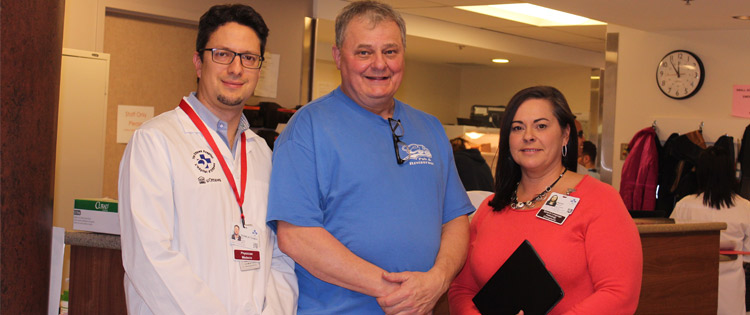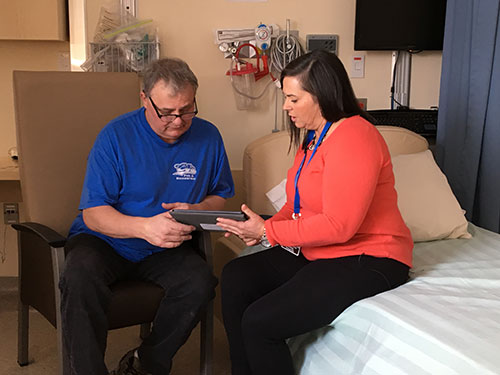
Norbert Franke (centre) was part of a pilot project led by Dr. Dar Dowlatshahi (left) and speech-language pathologist Karen Mallet (right) that tested whether hospitalized stroke patients would use a mobile tablet for speech and language therapy in between appointments.
On Dec. 2, 2014, Norbert Franke woke up to a stroke.
“I turned on the radio, and I had what felt like a streak of fire on the left side of my head,” said the now-60-year-old retired IT professional.
Recognizing the symptoms of stroke, Franke called an ambulance. It wasn’t until he arrived at The Ottawa Hospital Civic Campus that his right arm became weaker and harder to move.
“It was a slow stroke,” said Franke. “I fared better than most.”
During his recovery, Franke was invited to be part of a pilot project testing whether patients would use apps on a mobile tablet for additional speech and language therapy. While Franke’s stroke had not affected his language, he used the tablet’s exercises to strengthen the muscles in his face to keep them from drooping.
“I didn’t think it would do any harm,” said Franke. “Especially if it helps people who are in worse shape than me.”
Franke’s speech-language pathologist, Karen Mallet, gave him facial exercises and difficult pronunciations to work on, and she tracked his progress through notifications from the tablet.

Speech-language pathologist Karen Mallet (right) helped Norbert Franke recover after a stroke, using RecoverNow – a mobile tablet with apps that gave him facial exercises and difficult pronunciations to work on.
The mobile platform – called RecoverNow and believed to be the first of its kind – was developed by stroke specialist Dr. Dar Dowlatshahi and colleagues at The Ottawa Hospital.
“Patients admitted with stroke spend most of their time inactive and alone, awaiting tests and therapies,” said Dr. Dowlatshahi, who is also an associate professor at the University of Ottawa Brain and Mind Research Institute. “We designed RecoverNow to help patients engage in recovery therapy during this down-time while still in their hospital beds.”
RecoverNow allows doctors or speech-language pathologists to select various publicly-available stroke recovery apps from the Google Play store and monitor patients’ progress in real-time.
The study Franke took part in found that patients used the tablet for more than two hours per day, and 96 percent found it to be very convenient. The team is now conducting a second 30-patient feasibility study with an improved tablet developed in partnership with The Ottawa Hospital mHealth Research Team.
Today, Franke is back home, shovelling snow, gardening and doing chores around the house.
“I had to prove to myself that I could live alone again,” he said. “I’m pretty close to being back to normal.”

Support patient care and research at
The Ottawa Hospital


 To reset, hold the Ctrl key, then press 0.
To reset, hold the Ctrl key, then press 0.